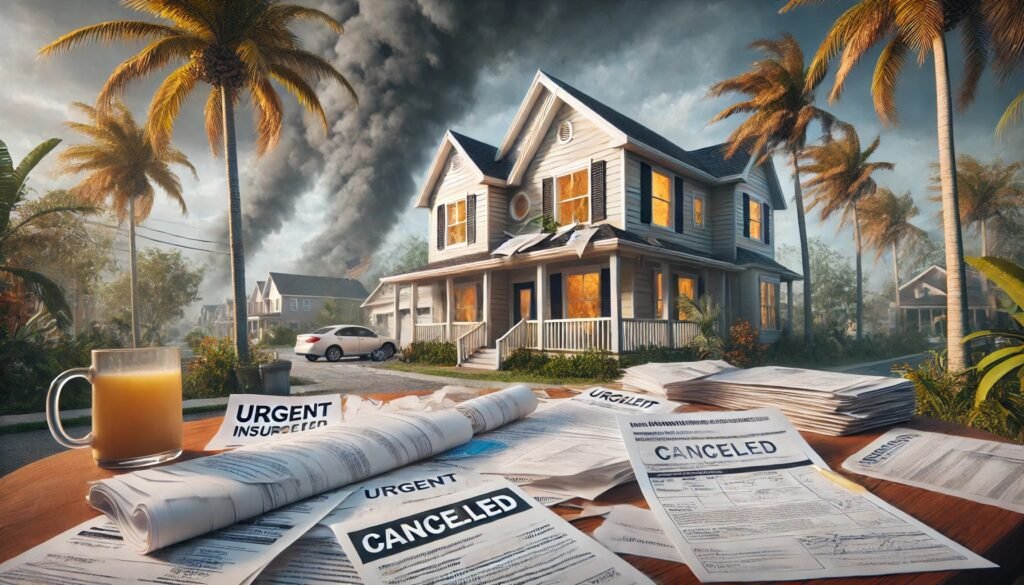Florida homeowners are facing an unprecedented homeowners insurance crisis. Premiums have skyrocketed, with the average annual cost of homeowners insurance in Florida doubling in the last few years. This rise is due to a combination of factors, including frequent hurricanes, increased lawsuits, and insurance companies pulling out of the state. If you’re a Florida homeowner, it’s essential to understand why this is happening and what steps you can take to save on your premiums.
What’s Behind the Insurance Rate Hikes?
- Hurricane Risk and Catastrophic Losses
Florida’s geographic location puts it at the epicenter of some of the most severe hurricane activity in the United States. With recent storms like Hurricane Ian and Helene causing billions of dollars in damages, insurance companies are facing increased costs. Insurers need to pay out large claims after every storm, which results in higher premiums to offset those losses.- Tip: Consider investing in storm-resistant upgrades such as impact-resistant windows and reinforced roofs. These upgrades may qualify you for discounts on your policy.
- Litigation and Fraud
One of the major drivers of rising costs is the wave of litigation and fraudulent claims. Florida has become notorious for “assignment of benefits” scams, where contractors inflate repair costs or file unnecessary claims on behalf of homeowners. This has led to a surge in lawsuits, which pushes insurance costs even higher.- Tip: Work only with licensed contractors and avoid signing over your insurance benefits to third parties without a clear understanding of the implications.
- Insurance Companies Leaving the State
Several major insurers have exited the Florida market due to the high-risk environment, further reducing competition and increasing rates. As a result, many homeowners have been forced to turn to Citizens Property Insurance, the state-backed insurer of last resort, which often comes with higher premiums.- Tip: Regularly shop around and compare policies. There are still private insurers operating in Florida, and some may offer better deals than others.
What Can You Do to Lower Your Premiums?
While the situation may seem grim, there are several steps homeowners can take to reduce their insurance costs:
- Harden Your Home Against Storms
Making your home more resilient to hurricane damage can lead to significant savings on your policy. Consider installing:- Impact-resistant windows
- Reinforced garage doors
- Roof tie-downs or hurricane straps
- These improvements not only protect your home but can qualify you for wind mitigation discounts, which are required by law to be offered by insurers in Florida.
- Increase Your Deductible
One way to lower your monthly premium is by opting for a higher deductible. While this means you’ll pay more out-of-pocket if a claim is filed, it can significantly reduce your overall insurance costs. - Bundle Your Insurance Policies
Many insurers offer discounts if you bundle your homeowners, auto, and other insurance policies together. Contact your insurance provider to see if this option is available and can reduce your total premium. - Maintain a Good Credit Score
In Florida, insurance companies are allowed to use your credit score as a factor in determining your premium. Maintaining a strong credit score can help you secure lower insurance rates. - Consider Flood Insurance
Although not required for all homeowners, having flood insurance is a smart move in Florida, where rising sea levels and frequent storms increase the risk of flooding. Flood damage is not covered under standard homeowners insurance, so obtaining separate coverage is crucial.- Tip: The National Flood Insurance Program (NFIP) provides affordable options, and many private insurers also offer competitive rates(Jimerson Birr)(Florida Realtors).
Conclusion: Stay Proactive and Informed
Florida’s homeowners insurance market is in flux, but homeowners can take proactive steps to reduce their premiums. By hardening your home, avoiding fraudulent contractors, and comparing policies, you can navigate the insurance landscape more effectively. For more information on the latest changes and how to manage your insurance costs, visit Florida Office of Insurance Regulation.



